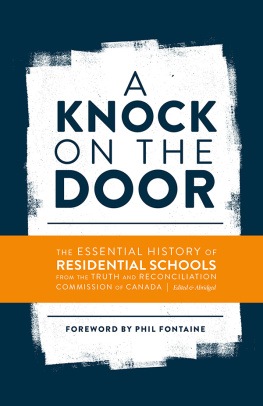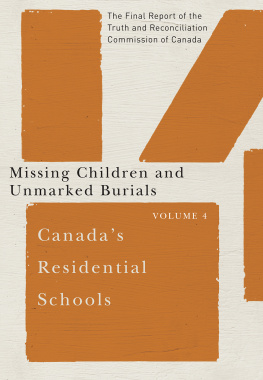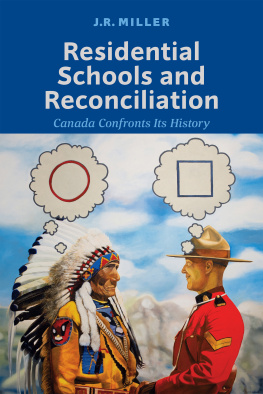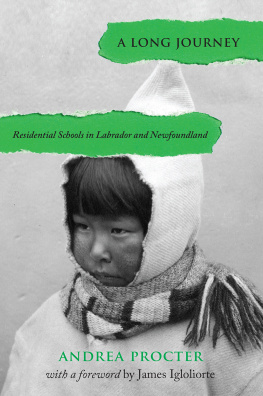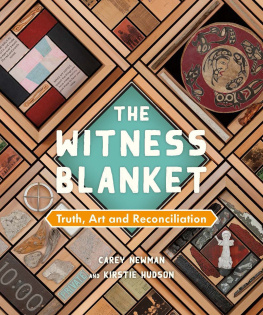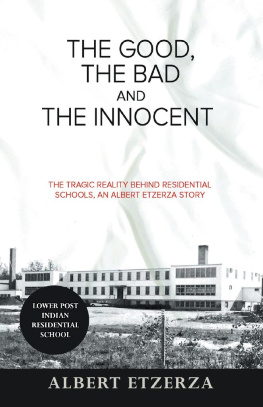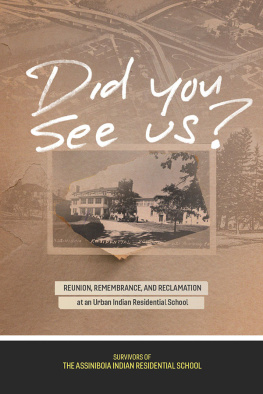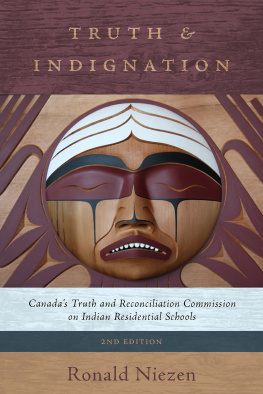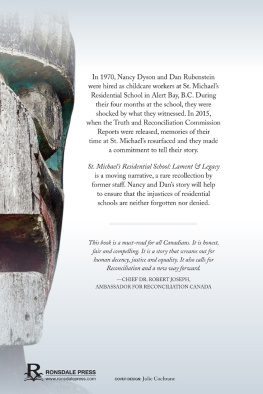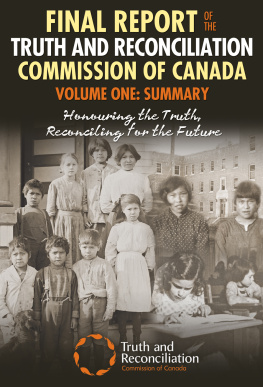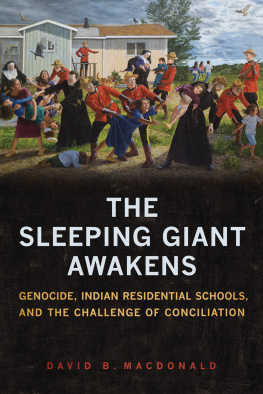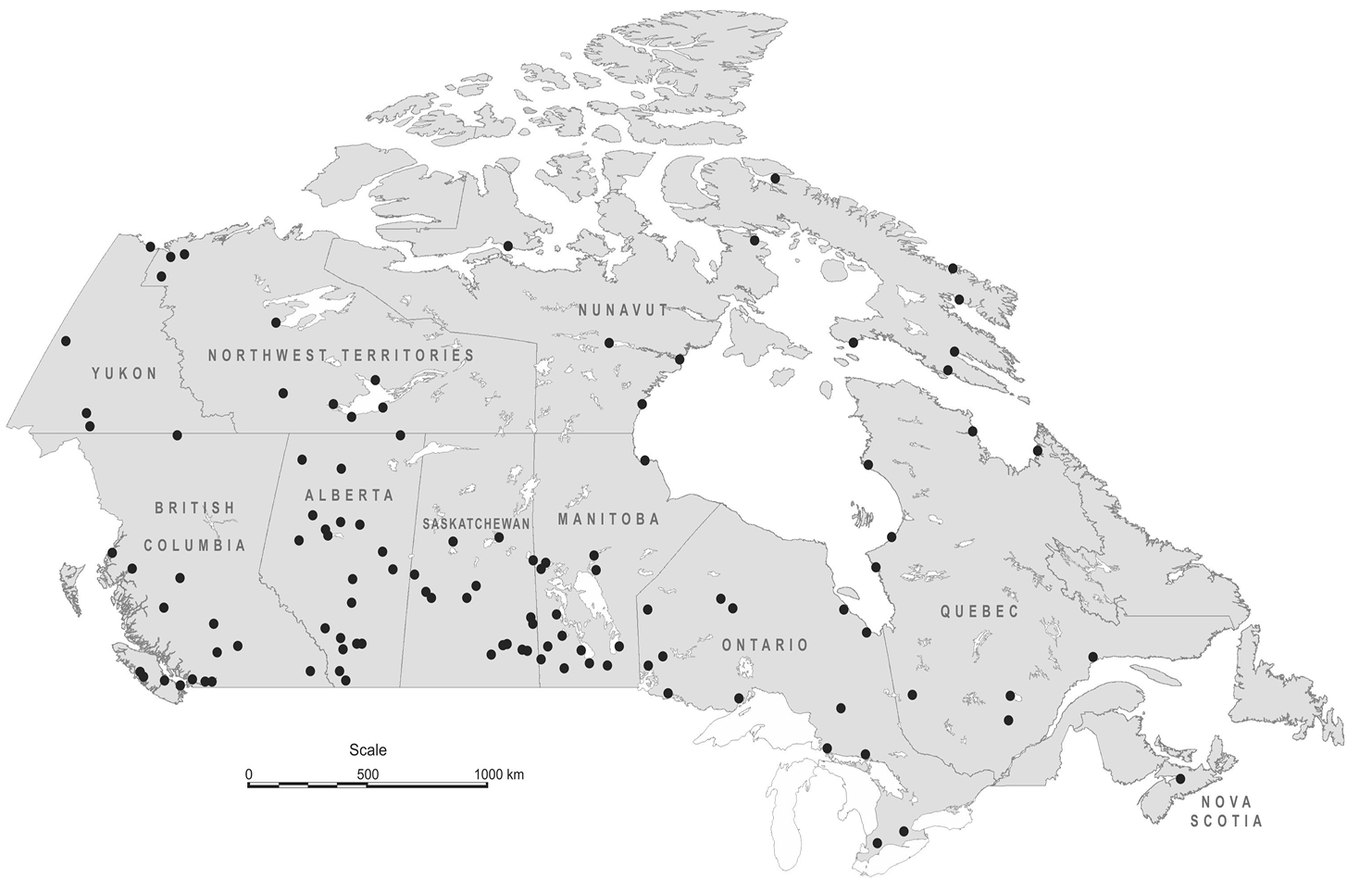A KNOCK
ON THE
DOOR
THE ESSENTIAL HISTORY
OF RESIDENTIAL SCHOOLS
From the Truth and Reconciliation Commission of Canada
Edited & Abridged
FOREWORD BY PHIL FONTAINE
University of Manitoba Press
Winnipeg, Manitoba
Canada R3T 2M5
uofmpress.ca
Published in collaboration with the National Centre for Truth and Reconciliation
The Introduction, Chapters 15, and Bibliography have been reproduced from reports of the Truth and Reconciliation Commission of Canada: What We Have Learned: Principles of Truth and Reconciliation (2015) and Truth and Reconciliation Commission of Canada: Calls to Action (2015). These texts are in the public domain and can be accessed at www.trc.ca.
Foreword Phil Fontaine
2016 Afterword Aime Craft 2016
Printed in Canada
Text printed on chlorine-free, 100% post-consumer recycled paper
20 19 18 17 16 1 2 3 4 5
All rights to this edition are reserved. No part of this publication may be reproduced or transmitted in any form or by any means, or stored in a database and retrieval system in Canada, without the prior written permission of the University of Manitoba Press, or, in the case of photocopying or any other reprographic copying, a licence from Access Copyright (Canadian Copyright Licensing Agency).
For an Access Copyright licence, visit www.accesscopyright.ca, or call 1-800-893-5777.
Cover and interior design: Jess Koroscil
Cataloguing-in-Publication information available from Library and Archives Canada
ISBN 978-0-88755-785-9 (pbk.)
ISBN 978-0-88755-540-4 (PDF)
ISBN 978-0-88755-538-1 (epub)
The University of Manitoba Press gratefully acknowledges the financial support for its publication program provided by the Government of Canada through the Canada Book Fund, the Canada Council for the Arts, the Manitoba Department of Culture, Heritage, Tourism, the Manitoba Arts Council, and the Manitoba Book Publishing Tax Credit.
A portion of all proceeds from the sale of this book will be donated to the National Centre for Truth and Reconciliation to assist with its ongoing educational and research activities.
CONTENTS
FOREWORD
My name is Phil Fontaine and I am a survivor.
Survivor is a word that years ago I used in hushed tones to describe my experience at Indian Residential School. But that was then. I have now come to say the word louder and more imbued with pride with every passing year of my life. This year, survivor has reached a crescendo.
The Truth and Reconciliation Commission Report, and its findings, represents a historic moment for all survivors; for all Indigenous people everywhere. It is, I think, a historic moment for Canada, the significance of which rests in not only what has been, but also what is to come.
I cannot speak for every survivoreach of us has our own storybut we do have common characteristics. As survivors, we number in the thousands. But if you count our brothers and sisters who are no longer with us, we number in the hundreds of thousands, possibly many more. All of us, the living and the dead, endured the effects of a policy that sought transformationtransformation of us as a people, as parents, grandparents, a transformation of all of our descendantsforever.
And so, the story of how we came to be here today is a long and painful one. The release, the publishing, the official stamp upon the findings of the Commission represents a monumental moment, and it will help put our shared collective pain behind us.
I am pleased to write this foreword to A Knock on the Door: The Essential History of Residential Schools from the Truth and Reconciliation Commission of Canada. This book presents the history of the Residential School system in a way that makes it accessible to all Canadians.
It addresses one of the key objectives of the Truth and Reconciliation Commission: to educate all Canadians about the Residential School experience and how this sad chapter in our shared history has affected the relationship between Indigenous and non-Indigenous people today.
The Commission spent five years putting together a report that was given life by the thousands of stories from survivors who experienced the misguided experiment of assimilation. Their contribution is immense, and their truths now enshrined for all time. Because of this hard work, our history can no longer be denied. The incontrovertible historical record before us, before all of Canada, has put an official limit on the range of permissible lies, to use Michael Ignatieffs term.
By describing and validating our story, the Report validates Canadas story. It demonstrates the righteousness and importance of our struggle. It tells us how the fundamental systems of governance failed to protect our social, economic, and cultural rights.
Education; health care; justice; child welfare: all of these systems and benefits are enjoyed, rightfully so, without a second thought by non-Indigenous Canadians. For Indigenous Canadians, wrongfully so, access to high quality education, health care, justice, child welfare was a passing dream.
What the Commissions Report tells us is that Canada is indeed in need of transformation, but that transformation is not of us. What is needed is for Canada to transform itself to embrace our true, shared culture and historyto understand that we are all, in fact, in this together.
This year happens to be the 800th anniversary of the Magna Carta, the great charter that inspired the Royal Proclamation of 1763our Magna Cartawhich in turn inspired the Commission and its prescriptions for reconciliation.
It has taken until 2015 to get here. It took the revelation of the experiences of residential school survivors to crystallize the reality that Canada was not the nation we wished it to be. But even so, beyond my fellow survivors I know that this would not have happened without the help of our allies. There are too many to name, and so to mention but a few I thank, first, the Chief Justice of Canada, the Rt. Hon. Beverley McLachlin, for speaking the words that could not be spoken: that what Canada did to us was cultural genocide. From the Supreme Court of Canada, she changed the vocabulary and narrative around residential schools.
I thank the Hon. Frank Iacobucci for his commitment to bring about a settlement that everyone could live with. I thank the negotiators for their tenacity. I thank the Rt. Hon. Paul Martin for his support throughout. I give thanks to the Commissioners for their compassionate work, for their courage, their patience, their protection, their understanding, their vision, and their wisdom. Their work affirms the survivors legacy.
The attempt to transform us failed. The true legacy of the survivors, then, will be the transformation of Canada.
Meegwetch,
Phil Fontaine
RESIDENTIAL SCHOOLS IN CANADA
SOURCE : Truth and Reconciliation Commission of Canada.

